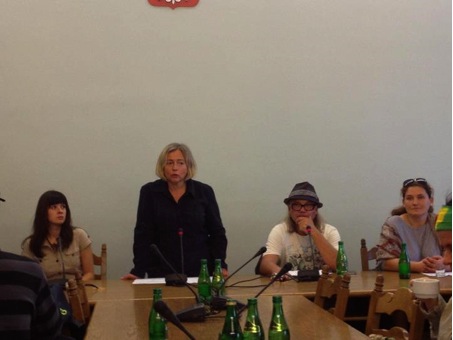"Prison for a joint? The effects of Polish drug law enforcement” was the theme of a recent conference in Warsaw, organized by national politicians and civil rights organizations. The event was held as a lead-up to several progressive legislative amendments planned in drug policy areas.
It would seem that sense may be about to score yet another victory over sensibility in Poland's drug regulations. A reform agenda, with three principal elements, has been drafted by 15 members of the Polish parliament's lower chamber, the Sejm, in a co-operative effort by policy experts and NGOs. The amendment proposes, first, to introduce drug 'assessment tables', which would make it possible to differentiate between drug possession cases based on the quantity of drugs involved. This is crucial, in order to be able to distinguish between major dealers and the masses of mainly young people who are caught by the authorities with small amounts of illicit substances. This distinction is especially important as, despite the reforms, Polish police are reportedly continuing their practice of stopping young people and searching them for drugs. The well known Polish singer Kora (Olga Jackowska) recently fell foul of such an inspection.
Secondly, the modified law would make it possible for psychiatrists to prescribe methadone countrywide. Today methadone maintenance treatment is only available in large cities, and is still very expensive. The new proposal would make this treatment widely available and lower its price, as currently only 15 percent of those in need have access to it. This is important in terms of harm reduction for opiate – mainly heroin – addicts. By allowing methadone on prescription, and handling their addiction within a “legal framework”, harm reduction can be significantly enhanced. The risk that opiate addicts may resort to criminal activities in order to acquire their dose, can also be considerably reduced, if it becomes legal to prescribe opiate substitutes.
The third amendment would make marijuana available for medical use in Poland. In order to make this possible, however, cannabis would first have to be taken off the list of illegal substances – those which it is explicitly prohibited to use as medicine – in the Act on Counteracting Drug Addiction. Also, to guarantee the smooth operation of the new rules related to medical marijuana, pharmaceutical and medical law needs to be amended. The medical marijuana regulation was proposed following the Polish government's move, in December 2011, to modify the Law on Counteracting Drug Addiction. Since that change, the prosecutor has been authorized to dismiss criminal charges, if the offender possesses only a small amount of drugs for personal use, and he (the prosecutor) finds that punishment is not necessary. According to a public opinion poll from the end of last year, 67 percent of Poles would legalize marijuana for personal use, 32 percent are against the idea, and only one percent undecided.
A good example of the changing approach towards drug-related issues was the mid-September hosting, by the Polish Semj, of the above-mentioned conference. Participants included the Deputy Speaker of the Sejm – Wanda Nowicka – in cooperation with the Ombudsman for the Addicts' Program, the Polish Drug Policy Network and the Parliamentary Group for Rational Drug Prevention Policy.
 The speakers were experts from the field of rational drug policy – therapists, lawyers and drug users as victims of restrictive drug policies. But despite the promising outlook, the Deputy Speaker made it clear that government bodies are fearful of assuming responsibility for defining what should count as 'small' quantities of drugs in the proposed drugs 'assement tables'.
The speakers were experts from the field of rational drug policy – therapists, lawyers and drug users as victims of restrictive drug policies. But despite the promising outlook, the Deputy Speaker made it clear that government bodies are fearful of assuming responsibility for defining what should count as 'small' quantities of drugs in the proposed drugs 'assement tables'.
On the other hand, Nowicka repeatedly said that it is time to get rid of the hypocrisy founded on a naïve faith that repressive drug law have solved so much as a single drug-related problem in Poland. On the contrary, Nowicka stressed that repressive regulations have caused a lot of new problems, without sustainably addressing the drugs trade. “It's time to wake up from this naïve dream and finally begin to act rationally,” she added.
In addition to its political side, the event also had a public one, since it was held against the background of the earlier prosecution of the Polish rock singer, Kora, for possession of 2.8 grams of marijuana. This, according to current national drug laws, could render her liable to up to 3 years' imprisonment. She is currently awaiting the verdict – while media attention driven by her case helps to drive the public dialogue towards reason-based drug regulation. The high profile of the debate is well illustrated by a front page Newsweek interview with former Polish President Aleksander Kwaśniewski, who expressed his support for Kora and called for an evidence-based debate about drugs.
Furthermore, Poland’s drugs law position is important, not only inside the borders of the largest new member-state of the European Union, but also because it could send a signal to its neighbors in the region, to turn towards more realistic and less harmful regulations related to illicit drugs.
Agnieszka Sieniawska/Warsaw




